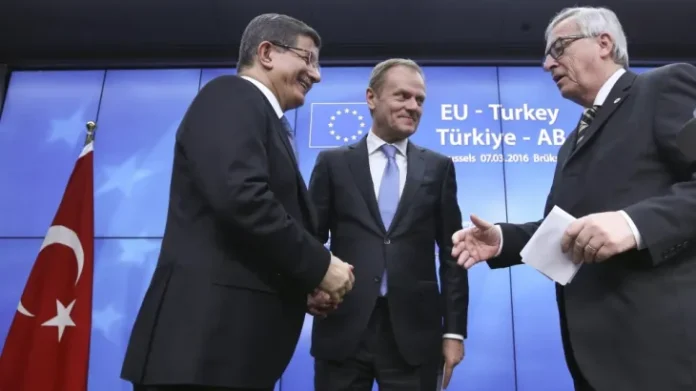Author: Kemal Kirişci
Affiliation: Center on the United States and Europe at Brookings Institution
Organization/Publisher: The Brookings Institution
Date/Place: March 17, 2021/Washington DC, USA
Type of Literature: Article
Word Count: 1775
Keywords: Turkey, EU, Migration Agreement, Turkish Economy, Job Creation
Brief:
Kemal Kirişci discusses the EU-Turkey migration agreement, its main statements, criticisms, consequences, and challenges. He claims that due to the absence of any enduring solutions for the Syrian refugees in Turkey, including voluntary return, resettlement, or local integration, there is a real need to rethink the agreement between the EU and Turkey. Kirişci argues that enhancing the prospects of formal employment for refugees and host communities would move the agreement forward, boost development, and maintain humanitarian assistance. Both the EU and Turkey were impelled to sign the 2016 agreement to “share the burden” created by the refugee crisis. Turkey stated it would increase border security to stop or slow down the flow of migrants to the EU. In addition, Greece has been given the right to return “all new irregular migrants” to Turkey. On the other hand, Turkey would receive two grants of 3 billion euros to support refugees. Additionally, Turkey’s EU accession process would be re-stimulated through opening a new chapter, along with tracing a visa liberalization program for Turkish nationals. Although the agreement has faced sharp criticism, it has managed to meet its main purpose—to decrease the illegal crossings to the EU. However, the most effective part of the deal that has been concerned with the refugees and their wellbeing is the Facility for Refugees in Turkey (FRIT). The FRIT provides a public space of cooperation between European entities, international agencies, and Turkish stakeholders. According to Kirişci, the FRIT has been a success and the EU should build on this success. There is a real need to provide sustainable livelihood to refugees, but two structural problems that are blocking the way to move forward are the employment of most of the Syrian refugees in the informal sector, and the weakness of the Turkish economy compared to 2013. Employment creation would be the solution for such a situation, by creating a demand for refugee labor. Trade liberalization is also recommended for economic growth and employment. The author suggests that the EU grant concessions that would enable increasing Turkish agricultural exports to the EU. To conclude, such policies would improve the economic situation through trade facilitation and enabling formal employment. This would lead to a win-win situation since it would enable refugees to become productive members by improving their socio-economic situation and stimulating Turkish economic growth. On the other hand, it will maintain refugees’ integration by decreasing the probability of their migration to the EU.
By: Yomna Süleyman, CIGA Research Assistant




